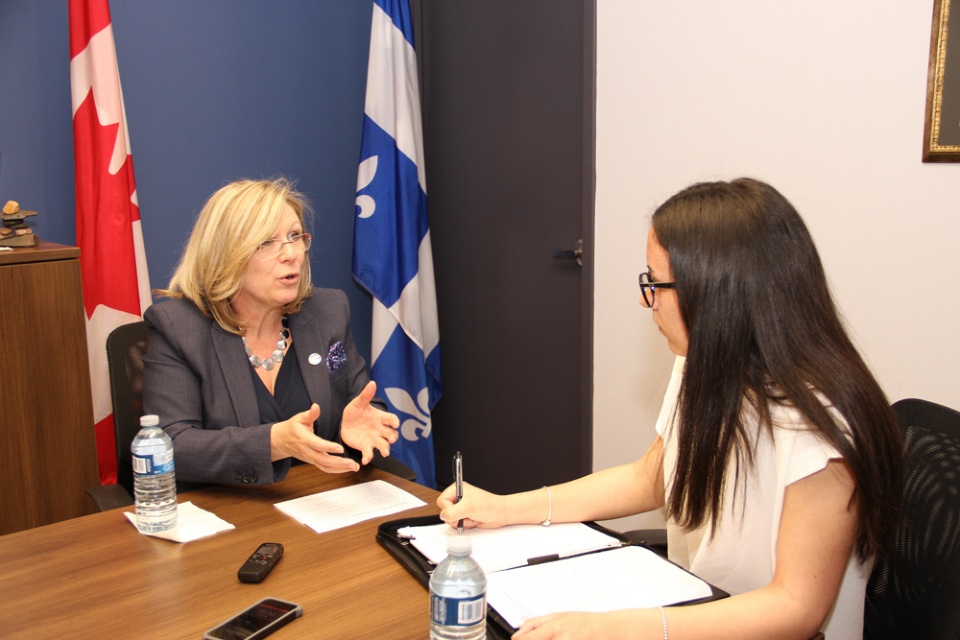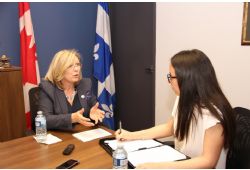Our Young Authors Contest winner for
this issue is Amber Diodati, a grade eight student at Laval Junior Academy. Amber had the opportunity to sit down with
Minister Francine Charbonneau, for a one-on-one interview.
Q; If
you had to write a book about your career in politics, what would be the title?
A; The title might surprise you. It
would be called "A Turn for the Surprise", because I wasn’t aiming,
expecting, nor was I going for this. The surprise was the turn of my life.
Q; After
all these years that you've been a public figure in the Laval community, what
would you want us to know about you that we don't already know?
A; Most people don’t really know
why every Sunday afternoon, I say no to any plan making. Sunday afternoons are
reserved for family time.
Q; Politicians
sometimes need to make decisions that are not always popular with the
community. What’s the toughest decision you needed to make?
A; The toughest decisions I make
are always about budgeting. If we could put more money in one place I would
always do it, but every time you make a decision to put more money in one
place, money will be removed from another place. Budgeting is always the
toughest because you know even though you’re making a good decision, you'll be
removing money from somewhere else and not be giving it enough. Every cause is
worth giving money to.
Q; Working
with seniors is a major focus for you. Why?
A; Well, we need to make sure
growing old is something good and making sure it’s the best for the elderly as
citizens. Being a grandmother, I want to make sure growing old in Quebec is the
best place to grow old. Let's take City of Laval that’s making sure that
seniors have services, that the government is giving services within the
hospitals and health care. We need to remember not only do we have young volunteers
but we also have many elderly people who do a lot of the volunteer work. Making
sure that the elderly are active and healthy is making sure we have the best
city in the world.
Q; Which
steps are you taking to make sure seniors get the respect they deserve and the
help they need in the retirement homes?
A; We need to work all together. We
need to make sure people know what to do and how to act. If were talking about
abuse of elderly, some think that abuse is only physical. There are many things
people do that they don’t know is a type of abuse. For example, when an elderly person crosses
the street, sometimes people think they don’t walk fast enough and will honk.
This is form of abuse. We need to make sure they understand that they need to
be patient and careful with the elderly. Taking care of the elderly is
important, but making sure others respect the elderly is more important.
Q; Considering
that you are the Minister responsible for anti-bullying, why is awareness for
anti-bullying important to you?
A; I think that there is no age for
bullying, but the consequences are catastrophic. In schools, there are gestures
that are not acceptable, but we can see bullying in work places, streets,
sports and in the retirement homes. It’s very important to make sure people are
aware of what they do and how they do it because no one has the same limits and
the consequences of the gesture is very important.
Q; What
concerns you the most about bullying in schools? Being the Minister responsible
for anti-bullying, how can you make a difference?
A; We do different things, such as
advertisements to make sure people understand what bullying is and we made sure
people were aware there are three types of people involved in bullying; the
victim, the bully and the bystander. We’re showing people that as a bystander
you should go get help and help the person who's getting bullied, whether it’s
by going to the school principal or helping the victim reach out to someone to talk
about the bullying.
Q; What
inspired you to become a politician?
A; I was a parent with three
children in school who I wanted to make sure had the best, and joined the
school committees. I had other parents telling me I should be part of the
school board, so I decided to join. When the president of the school board left
I became the Chairperson. I was happy
fighting for all the children in the Commission
Scolaire de Laval and making sure the students got the help they needed.
One day, someone suggested I become a MNA and in 2008, I said yes.
Q; Would
you consider eventually running for Prime Minister of Quebec?
A; I would have to say no, I
wouldn’t be able to be a prime minister. First of all, I don’t think I qualify,
and the piece of life that I have that’s left is what I need. The Prime Minister
has just about no life at all; he has to dedicate 24 hours a day of what he
does to the citizens of Quebec. Now that I have more responsibility, I take
them and follow them through, but I wouldn’t raise my hand to be a prime minster.
Q; Do
you believe social media can make a difference in electoral campaigns for
better or worse?
A; I think that social media is
something very nice and very bad. If people don’t like you and decide to
destroy your reputation, or post bad pictures of you, it could be the worst
thing that can happen to you. As adults, we’re not different from teenagers; when
we see something bad on social media it stays in our heads. If using social media,
you need to make sure it doesn’t contaminate you and be very strong. Being in a
campaign only using social media wouldn’t be a good idea considering you see
bullying and also see fake news.
Q; Which
international figure inspires you the most?
A; You would be very surprised to
know that I'm a very big fan of Oprah Winfrey. I think that she represents
someone that comes from a life of misery in the beginning and believed in
herself to become a better person. To this day, when she wakes up in the
morning, she asks herself if she can be a better person and for me, that’s inspirational.
Q; What
is your advice to someone going into politics after university?
A; Honestly, I would tell them to
go to work and not to go into politics right away. You need to know how it is
to have a job and how life is on the day-to-day basis. If you go straight to
politics, how can you know how it works on the day-to-day basis? You might have
an idea, you see people going to work but how would you be able to put yourself
in their skin without knowing the day-to- day basics of working?
Q; Reading
your biography I noticed you have a background in hairdressing. What made you
make such a drastic change in your career?
A;
I wanted a work place where I would use my time moving and meeting
people. Being a hairdresser is the best place, you get to talk to people, make
them feel good and give advice. After a year of practicing I got an allergic
reaction on my hands from the products, and doctors told me I needed to change
jobs or start working with my feet! [laughs]
Q; In
your career as a politician, which memorable moment will you cherish forever?
A; That’s hard to say because I've
met and helped people that are extraordinary and it’s hard to point out which is
more memorable. As a Minister, I get to celebrate elderly people who volunteer
in their communities. I find one person from every region of Quebec and read
what they’ve done during the year to help the communities and they receive a
trophy for what they've done. There was never one year that there were any dry
eyes in that room because everyone's so touched by the acts of the volunteers.

 In The Latest Issue:Latest Issue:
In The Latest Issue:Latest Issue:
- A Bittersweet Farewell
- The new Laval Aquatic Co...
- The End of an Era:
Articles
Calendar
Virtual- ANNUAL TEACHER APPRECIATION CONTEST
- APPUI LAVAL
- ARTS & CULTURE
- CAMPS
- CAR GUIDE
- CCIL
- CENTENNIAL ACADEMY
- CHARITY FUNDRAISING
- CITYTV
- COSMODÔME
- COMMUNITY CONNECTIONS
- COVER STORY
- DINA DIMITRATOS
- ÉCOLE SUPÉRIEURE DE BALLET DU QUÉBEC
- EDITORIALS
- ÉDUCALOI
- EDUCATION
- EMPLOYMENT & ENTREPRENEURSHIP
- FÊTE DE LA FAMILLE
- FÊTE DU QUARTIER SAINT-BRUNO
- FAMILIES
- FESTIVAL LAVAL LAUGHS
- FÊTE DE QUARTIER VAL-DES-BRISES
- FINANCES
- GLI CUMBARE
- GROUPE RENO-EXPERT
- HEALTH & WELL-BEING
- 30 MINUTE HIT
- ANXIETY
- CHILDREN`S HEALTH & WELLNESS
- CLOSE AID
- DENTAL WELLNESS
- EXTREME EVOLUTION SPORTS CENTRE
- FONDATION CITÉ DE LA SANTÉ
- GENERAL
- HEARING HEALTH
- MESSAGES FROM THE HEALTH AGENCY OF CANADA
- MENTAL HEALTH
- SEXUALITY
- SOCIAL INTEGRATION
- SPECIAL NEEDS
- TEENS
- THE NUTRITION CORNER
- THE NUTRITION CORNER - RECIPES
- VACATION DESTINATION
- WOMEN'S FITNESS
- WOMEN'S HEALTH
- HILTON MONTREAL/LAVAL
- HOME & GARDEN
- INTERNATIONAL WOMEN'S DAY
- JAGUAR LAVAL
- LAVAL À VÉLO
- LAVAL FAMILIES TV SHOW
- LAVAL FAMILIES MAGAZINE CARES
- LAVAL URBAN IN NATURE
- LE PARCOURS DES HÉROS
- LES PETITS GOURMETS DANS MA COUR
- LEON'S FURNITURE
- LEONARDO DA VINCI CENTRE
- LFM PREMIERES
- LIFE BALANCE
- M.P. PROFILE
- MISS EDGAR'S AND MISS CRAMP'S SCHOOL
- MISSING CHILDREN'S NETWORK
- NETFOLIE
- NORTH STAR ACADEMY LAVAL
- OUTFRONT MEDIA
- PASSION SOCCER
- PARC DE LA RIVIÈRE-DES-MILLE-ÎLES
- PÂTISSERIE ST-MARTIN
- PIZZERIA LÌOLÀ
- PLACE BELL
- PORTRAITS OF YOUR MNA'S
- ROCKET DE LAVAL
- SACRED HEART SCHOOL
- SCOTIA BANK
- SHERATON LAVAL HOTEL
- SOCIÉTÉ ALZHEIMER LAVAL
- STATION 55
- STL
- SUBARU DE LAVAL
- TECHNOLOGY
- TEDXLAVAL
- TODAY`S LAURENTIANS AND LANAUDIÈRE
- TODAY`S LAVAL
- WARNER MUSIC
- THIS ISSUE
- MOST RECENT
Magazine
Interview with Minister Charbonneau
Articles ~e 105,7 Rythme FM 4 chemins Annual Teacher Appreciation Contest Appui Laval Arts & Culture Ballet Eddy Toussaint Camps THIS ISSUE MORE...
CONTESTS Enter our contests
CONTESTS Enter our contests
CALENDAR
Events & Activities
COMMUNITY Posts Events
PUBLICATIONS Our Magazine Family Resource Directory
LFM BUSINESS NETWORK Learn more
COUPONS Click to save!
COMMUNITY Posts Events
PUBLICATIONS Our Magazine Family Resource Directory
LFM BUSINESS NETWORK Learn more
COUPONS Click to save!
SUBSCRIPTIONS
Subscribe to the magazine
Un-Subscribe
E-NEWSLETTER Subscribe to our E-newsletter Un-Subscribe
WRITE FOR US Guidelines & Submissions
POLLS Vote today!
E-NEWSLETTER Subscribe to our E-newsletter Un-Subscribe
WRITE FOR US Guidelines & Submissions
POLLS Vote today!
ADVERTISERS
How to & Media guide
Pay your LFM invoice
SUGGESTIONS Reader's Survey Suggest a Listing
LFM About Us Our Mission Giving Back Contact Us
SUGGESTIONS Reader's Survey Suggest a Listing
LFM About Us Our Mission Giving Back Contact Us
 PICK-UP LOCATIONS
Get a copy of LFM!
PICK-UP LOCATIONS
Get a copy of LFM!
TERMS & CONDITIONS Privacy | Terms
ISSN (ONLINE) 2291-1677
ISSN (PRINT) 2291-1677
Website by ZENxDESIGN



 BY:
BY: 
Tweet
Share